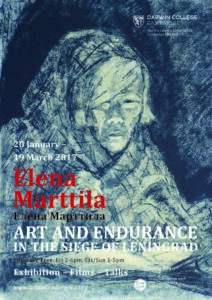‘While my hand can still hold a pencil, I will continue to tell the story
of my fellow Leningraders, who are dear to my heart.
I wish for this exhibition to become a warning against the dangers of war
for the existence of our humanity.’
Elena Marttila
ELENA MARTTILA: ART AND ENDURANCE IN THE SIEGE OF LENINGRAD
Darwin College, Cambridge, 20 January – 19 March 2017
The siege of Leningrad was the longest and hardest in history and one of the most terrible pages in the annals of World War II. For 872 days the city of Leningrad was surrounded by the Axis forces and cut off from vital supplies – food, electricity, and water – as well as from all sources of information. The people of Leningrad endured the most extreme conditions, particularly during the appalling winter of 1941. They were subjected to unremitting bombing and shelling. Their health and strength was broken down by a famine so acute that only the hardiest and luckiest could survive. Death was a constant presence, and the loss of life – a million of the city’s inhabitants – was immense.
In the midst of this human catastrophe was a remarkable witness – an eighteen-year-old art student, Elena Marttila, whose work is celebrated in this exhibition. Elena continued to draw in the most difficult conditions and with whatever materials were to hand.
There are portraits of famous figures of the siege – Olga Berggolts, the poet and writer, whose radio broadcasts helped keep up the spirits of the people of Leningrad, and Dmitry Shostakovich, whose Leningrad symphony gave voice to the courage and desperate determination that took the city, and the Russian people, through to final victory.
However it is as a unique record of the ordinary lives of the people of Leningrad that her work is most moving and valuable to a modern audience. Elena drew the people she knew and the sights of the streets – the musician dragging his cello on a sledge to a hard-won concert; the truck driver who helped to evacuate children across Lake Ladoga; the bodies of those who fell down in the snow and died of hunger and exhaustion; the interior of a typical Leningrad apartment in which the inhabitants have fed the stove with the last of their books.
Elena’s vision of the siege of Leningrad was not the heroic one favoured by the authorities, and after the war she was instructed to destroy her work, but she was determined to preserve it as a testimony for future generations. Elena developed her sketches into lithographs and engravings on cardboard – a technique she developed to express the blurring which afflicted the eyesight of the malnourished Leningraders. Marttila’s art allows us to see the siege of Leningrad literally through the eyes of those who endured it.
The exhibition, which will be centred on the lithographs of her Leningrad drawings, and her unique engravings, will take place in Darwin College, Cambridge, 20 January -19 March 2017 to coincide with the College’s Darwin Lecture Series, which this year is on the theme of ‘Extremes’. We are grateful to Darwin College for their generosity in making the beautiful space of the Old Library available to us.
Around the works of art, the exhibition sets out to create a wider historical and cultural context – maps showing the disposition of the German forces, the Russian defence, and the famous ‘Road of Life’, extracts from the poetry and music which continued to flourish in the direst conditions, photographs of the city under siege, together with a programme of talks and film screenings will enrich the visitor’s experience.
The siege of Leningrad was lifted on 27 January 1944.
Elena Marttila, who will be 94 years old in January, is one of the last witnesses left among us. This exhibition would not be possible without her invaluable support and inspiration. It is a tribute to her life, legacy and artistic integrity, and is dedicated to her friends and to the people of the City of Leningrad, those whose lives were lost, and those who endured the blockade but are no longer with us. It serves as the artist’s plea against war.
The exhibition is curated by Ksenia Afonina – independent curator and researcher into the art of World War II and Libby Howie, an independent curator with a specialist knowledge of graphic art. This project has been realised with the support of Sotheby’s and in collaboration with The Cambridge Russian-Speaking Society.

